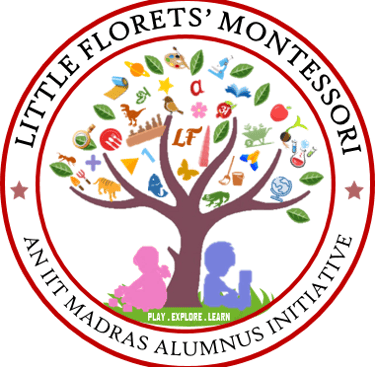Admissions open for YEAR 2026-27
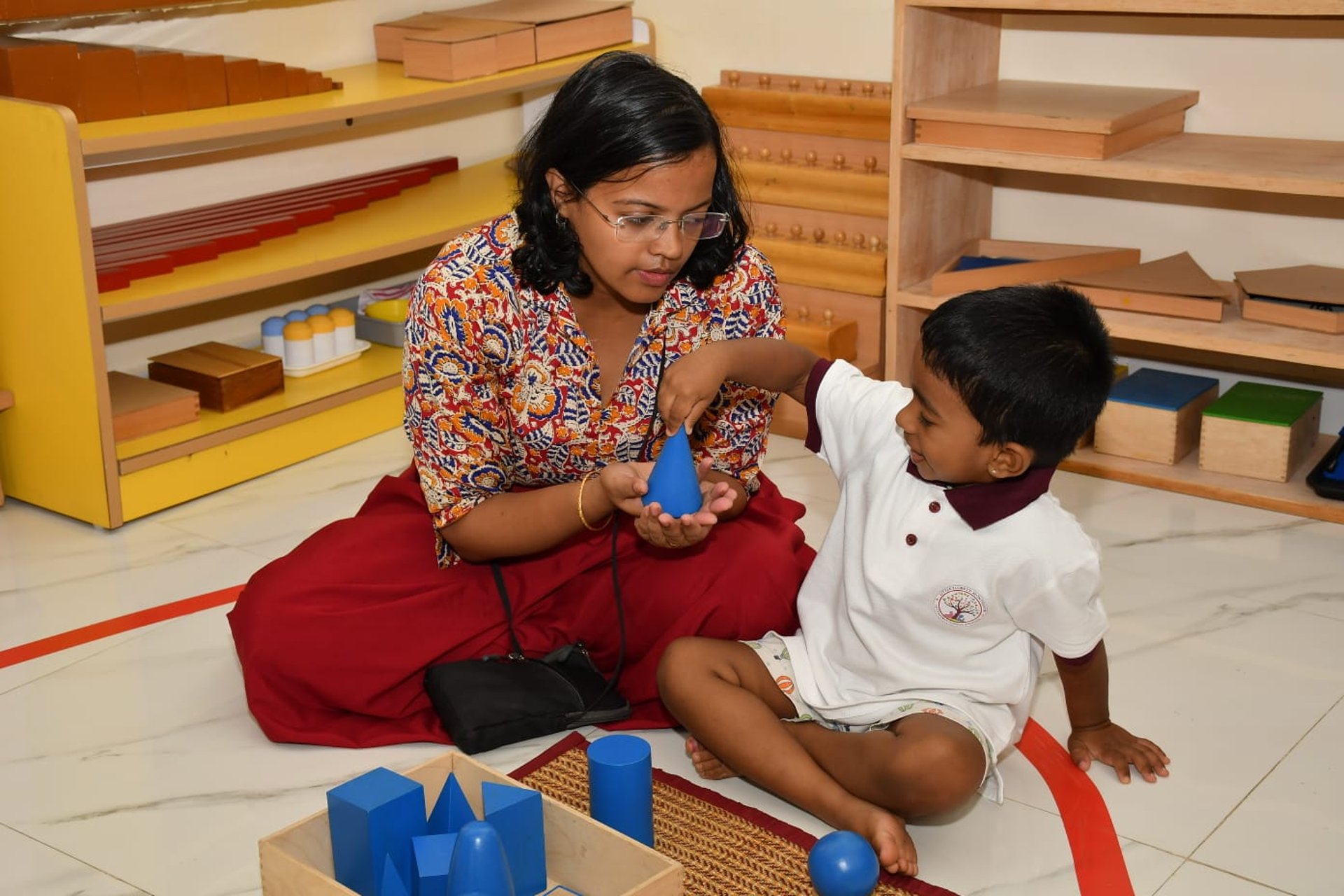
Primary Environment
2.5 to 6 years
Working hours
9:00 am to 12:00 pm (2.5 to 4 years)
9:00 am to 2:30 pm (4 to 6 years)
Primary Environment
The Montessori Primary Program spans three years and is ideally suited for children aged 2 years and 6 months to 6 years. In this environment, children are granted the freedom to choose and move, allowing them to learn individually and independently, while also collaborating with peers of varying ages. Creating a nurturing environment for young learners at Little Florets' Montessori, foster independence, creativity, and critical thinking through hands-on learning. With AMI-trained educators and a thoughtfully prepared environment, we empower children to explore, grow, and thrive.


Our Educators and Caretakers
Our Montessori environment is led by highly qualified AMI (Association Montessori Internationale) trained teachers(fondly called "chithis"), the gold standard in Montessori education. These dedicated educators deeply understand child development and the Montessori philosophy, creating a nurturing and enriching experience for every child. With expertise, they observe, guide and support each child’s unique journey, fostering independence, curiosity and a love for learning in a carefully prepared space.
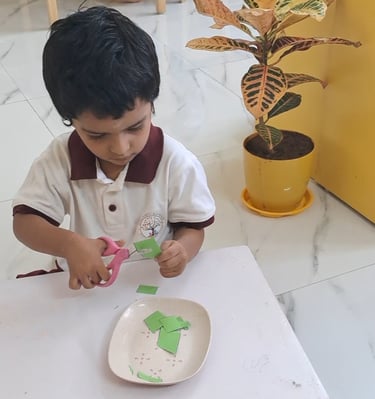

Each Montessori learning area is designed to spark curiosity, encourage hands-on exploration, and nurture creativity. Through self-directed activities, children gain the freedom to choose, experiment, and discover at their own pace, fostering a deep sense of independence and confidence. By engaging with meaningful, real-world experiences, they develop critical thinking, problem-solving skills, and intrinsic motivation. This approach instills a lifelong love for learning, empowering children to grow into curious, capable, and self-driven individuals.
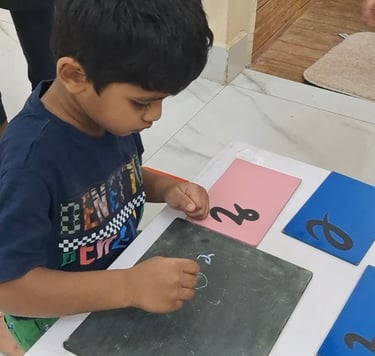



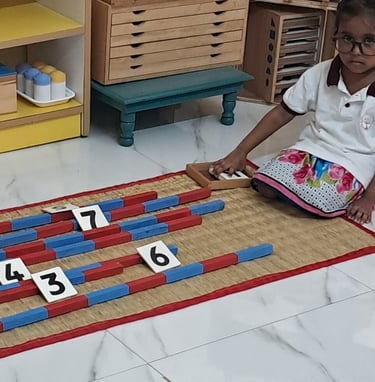




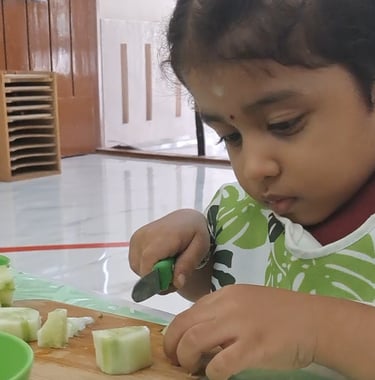
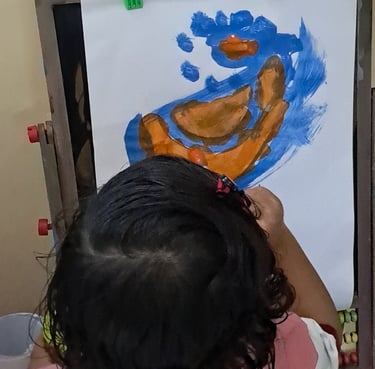

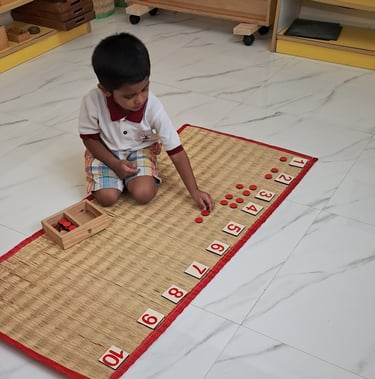


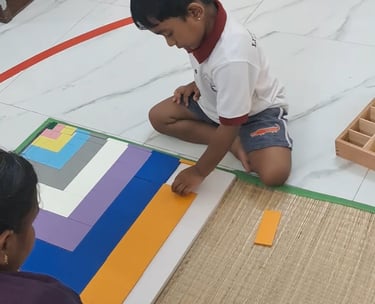
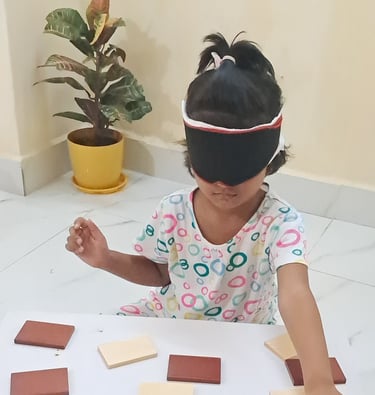

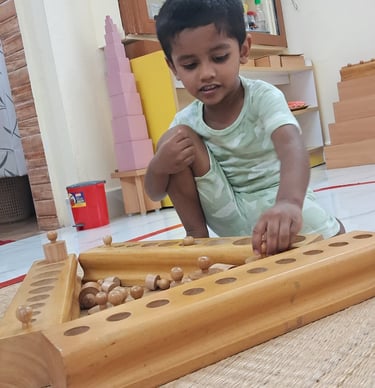

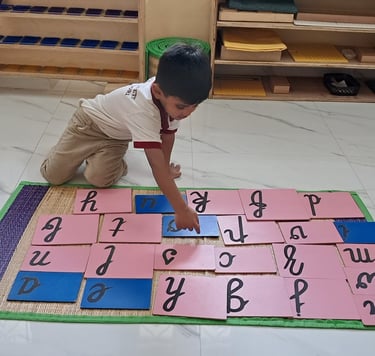



Our Curriculum
In the Montessori environment, learning is organized into five key areas to foster holistic development:
Practical Life: Activities like such as pouring, buttoning, and folding, help children develop fine motor skills, hand-eye coordination, and independence. These hands-on tasks enhance focus, patience, and problem-solving abilities, preparing them for everyday life. By engaging in purposeful work, children build confidence, self-discipline, and a sense of responsibility. These foundational skills support cognitive growth and overall development, fostering a lifelong love for learning.
Sensorial: Materials help children refine their perception of size, shape, texture, color, sound, and smell, enhancing their cognitive and observational skills. By working with specialized materials like pink tower, color tablets, and geometric solids, children develop visual discrimination, spatial awareness, and logical thinking. These hands-on experiences lay a strong foundation for mathematical concepts, scientific inquiry, and problem-solving. Through exploration and discovery, children strengthen their ability to classify, compare, and analyze the world around them.
Language: Montessori language education uses hands-on materials to introduce phonics, writing, and reading in English, Tamil and Hindi, fostering multilingual proficiency from an early age. Through activities like sandpaper letters, moveable alphabets, and storytelling, children develop letter recognition, vocabulary, and sentence formation skills. The phonetic approach helps build a strong foundation for reading fluency and comprehension in multiple languages. By engaging in interactive and sensory-rich experiences, children gain confidence in communication, enhancing their overall literacy and cognitive development.
Mathematics: Using hands-on materials like golden beads, number rods, and spindle boxes to help children grasp counting, addition, and subtraction in a concrete way. As they progress, they explore multiplication, division, fractions, and geometry, building a deep, intuitive understanding of mathematical concepts. This interactive, step-by-step approach fosters confidence, problem-solving skills, and a lifelong appreciation for numbers and patterns.
Cultural Studies: Children are introduced to Geography, Science, Art and Music to foster a deep appreciation for the world’s diversity and interconnectedness. Through puzzle maps, nature exploration, art, and music, children develop curiosity, respect for different cultures, and a broader worldview. These hands-on experiences enhance critical thinking, creativity, and a love for discovery, laying the foundation for global awareness and lifelong learning.
To experience the magic of our Montessori primary environment firsthand, schedule a school visit and see how our thoughtfully prepared classrooms, nurturing educators, and child-led learning approach support your child’s curiosity, independence and love for learning. We look forward to welcoming you and your family to Little Florets' Montessori
Our caretakers (fondly called "akkas") play a vital role in supporting children's daily activities and fostering a nurturing atmosphere. They assist with tasks such as organizing learning materials, maintaining the classroom environment, and attending to the children's personal needs, thereby allowing the Montessori teachers to focus on delivering individualized instruction.
Key characteristics of Primary environment
Prepared Environment: The Montessori classroom is thoughtfully designed to meet the developmental needs of young children. Child-sized furniture, open shelves, and clearly defined areas for different activities (practical life, sensorial, language, math, and culture) make the environment accessible and inviting. Materials are arranged in an orderly fashion and are within reach, allowing children to make independent choices. The calm, structured space fosters focus, concentration, and a sense of security.

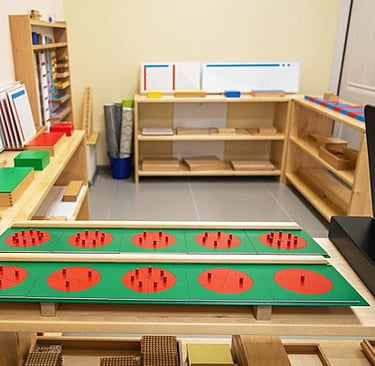


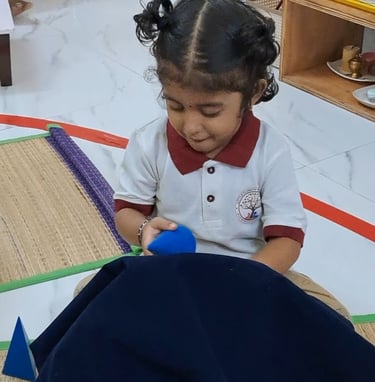

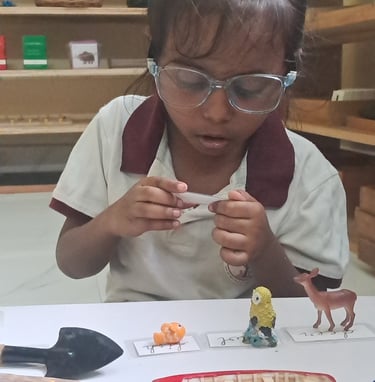

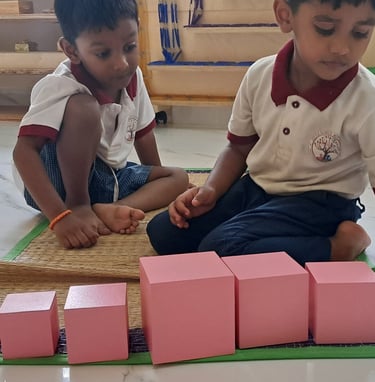

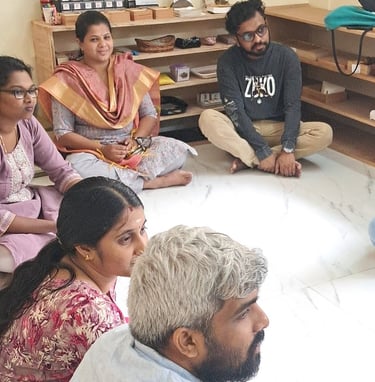

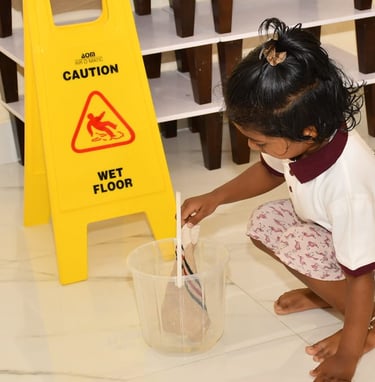

Freedom within limits: Children are given the freedom to choose their own work from a range of activities prepared by the teacher, encouraging decision-making and responsibility. However, this freedom comes with gentle boundaries—children are expected to use materials respectfully, work peacefully, and follow community rules. This balance helps children learn self-discipline, respect for others, and how to function within a community.
Individualized learning: Montessori teachers, often referred to as “chithis,” observe each child closely to understand their learning style, interests, and developmental needs. Lessons are presented one-on-one or in small groups, and children progress at their own pace. This individualized approach supports each child's unique learning journey and helps build confidence and competence.
Hands-on learning: Montessori materials are concrete, purposeful, and designed for self-correction. Children learn abstract concepts by manipulating physical objects, which strengthens their understanding and retention. Whether pouring water, building numbers with beads, or tracing letters with sandpaper, children engage all their senses in the learning process.
Emphasis on Independence: From the moment they enter the environment, children are encouraged to take care of themselves, their environment, and their learning. Practical life activities such as pouring, buttoning, and sweeping teach life skills and develop fine motor control. Over time, children become more self-reliant, capable of making choices, solving problems, and managing their emotions.
Social Interaction: Our Montessori primary environment is a small community where children learn to collaborate, communicate, and resolve conflicts peacefully. Mixed-age groups allow younger children to learn from older peers, and older children to reinforce their knowledge by helping others. This dynamic builds empathy, leadership skills, and a strong sense of belonging.
Three-hour work cycle: Each morning typically includes a three-hour uninterrupted work period. During this time, children can choose and engage deeply with their activities without unnecessary interruptions. This extended period allows for concentration, repetition, exploration, and the satisfaction of completing a task from beginning to end. It nurtures intrinsic motivation and a love of learning.
Parent involvement: Parents are viewed as partners in the child’s educational journey. Montessori schools often offer parent education workshops, classroom observations, and regular communication to help families understand and support the Montessori philosophy at home. This collaboration fosters consistency and helps children thrive both at school and in their home environment.
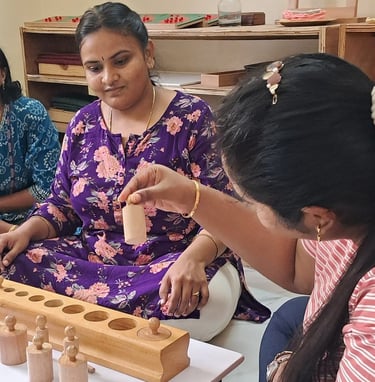

In Montessori education, the three-year cycle is a foundational element where children remain in the same classroom community for three consecutive years, typically spanning ages 3 to 6 in the Primary program. This structure aligns with Dr. Maria Montessori's understanding of developmental stages, allowing children to progress from being newcomers to mentors within their learning environment.
How the Three-Year Cycle Works
First Year (Explorers): At around age 3, children enter the classroom as the youngest members. They spend this year exploring the environment, absorbing new information, and adapting to the routines and materials.
Second Year (Experimenters): As four-year-olds, they begin to experiment more deeply with the materials, building upon their initial experiences. Their familiarity with the environment allows them to engage in more complex activities and collaborative work.
Third Year (Experts/Leaders): By age 5 or 6, children become the oldest in the classroom. They take on leadership roles, mentoring younger peers and consolidating their own knowledge by teaching others. This year is crucial for reinforcing their learning and developing confidence.
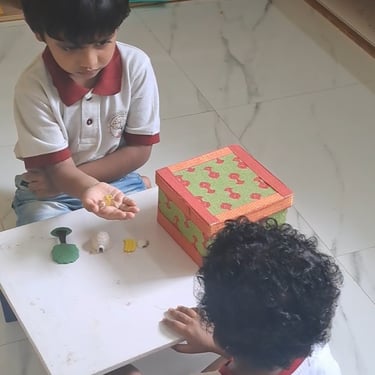

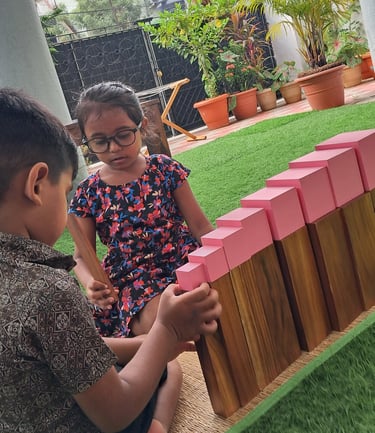

The Montessori Three-Year Cycle : Building Confidence, Leadership & Lifelong Learning


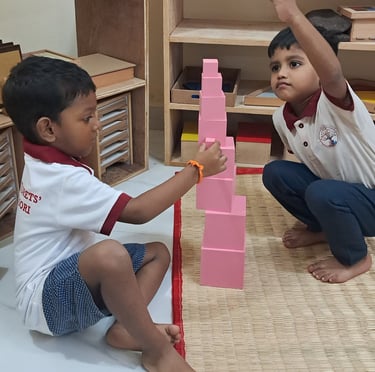

Benefits of the Three-Year Cycle
Continuity and Stability: Remaining with the same teacher and peer group for three years fosters strong, trusting relationships, providing a stable foundation for learning.
Individualized Learning: Teachers gain deep insights into each child's learning style and needs, allowing for personalized instruction that supports optimal development.
Social Development: The mixed-age setting encourages younger children to learn from older peers, while older children develop empathy and leadership skills by mentoring newcomers.
Comprehensive Skill Mastery: The extended time frame enables children to revisit and master concepts at their own pace, leading to a thorough understanding and readiness for future educational challenges.
Note: Ensuring your child completes the full Montessori three-year cycle is crucial for unlocking their complete potential. This comprehensive journey fosters not only academic excellence but also cultivates essential life skills such as leadership, independence, and social responsibility. By progressing through the stages of learner, mentor, and leader within a stable and nurturing environment, your child gains a profound sense of confidence and mastery. This solid foundation is indispensable for lifelong success and personal growth. Departing before completing the cycle may deprive your child of these critical developmental milestones, potentially hindering their holistic development. Therefore, committing to the entire three-year Montessori program is an investment in your child's future, ensuring they reap the full spectrum of benefits this educational approach offers.
Assessments and Progress Reports
At Little Florets' Montessori, we believe every child grows and learns in their own unique way. Instead of using traditional exams or tests, we focus on understanding each child as an individual.
Our trained teachers work closely with the children, giving one-on-one lessons and carefully watching how each child learns and develops. They keep detailed notes and records to track progress and plan the next steps in learning.
Every month, the teacher creates a personalized plan for each child, based on their needs and interests. New activities are introduced when the child is ready, and they are encouraged to explore and learn at their own pace using hands-on materials. We use a "Record of Work" to keep track of what your child is doing in the classroom and how they are growing.
We value strong communication with parents. Twice a year—in October and March—we invite you for parent-teacher meetings to talk about your child’s progress and share classroom experiences. These meetings help us work together to support your child in the best possible way.
We don’t believe in giving young children tests or exams. We know that children are naturally curious and want to learn. Instead of measuring them with scores, we focus on building confidence, independence, and a natural desire to learn.
At Little Florets' Montessori, we believe children shine brightest when they enjoy what they’re doing and feel free to express themselves. Growth happens naturally when learning is joyful and pressure-free.
Rather than encouraging competition, we focus on building confidence, self-esteem, and teamwork. Every child is unique, and we celebrate their efforts without comparison. Whether they are painting, dancing, running, or singing, what matters most is the happiness they feel while doing it.
We offer children opportunities to express themselves through cultural activities and creative performances. These experiences are meant to be fun, inclusive, and meaningful—allowing each child to participate in their own way, without judgment.
Our goal is to help children use their time in a thoughtful and creative way that supports both their own well-being and that of the community around them.
Competitions and Cultural activities


